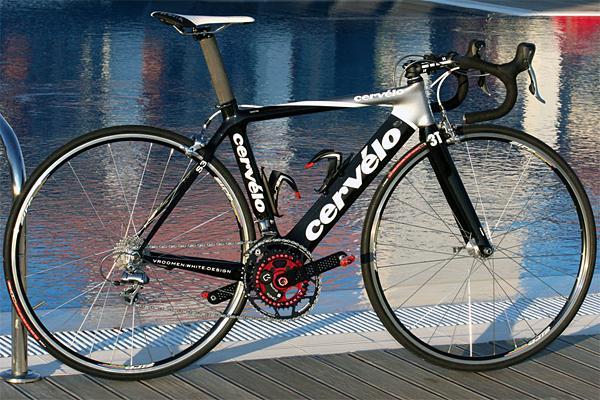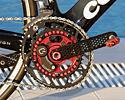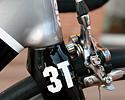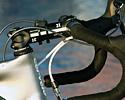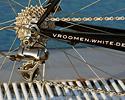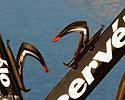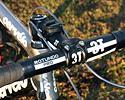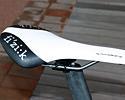
Recently on Cyclingnews.com |
Pro bikes, February 6, 2008
Carlos Sastre's Cervélo TestTeam Cervélo S3
The 2008 Tour de France champion finally goes aeroBy Shane Stokes Carlos Sastre became one of the hottest tickets in cycling after winning the Tour de France last year. The news that he was on the market for a new team led to several offers, including one from the big-bucks Katusha squad, but Sastre ultimately opted to go with the new Cervélo TestTeam. Citing the opportunity to be more involved in new product development, Sastre said he was looking forward to giving his feedback to Cervélo and the other partners. "It is a new project which fits very well with my way of being," he said in September. "It offers the opportunity to open frontiers and collaborate more actively with our sponsors and their clients. At the same time, we can contribute more efficiently to improving the technology of our materials." As a former CSC rider, Sastre was of course very familiar with Cervélo frames. He moved to the team of Bjarne Riis for the 2002 season and has ridden the technology-intensive bikes ever since CSC switched to them the following year. Unlike other riders on the team, though, Sastre has always opted for frames with standard profile tubes rather than more aerodynamic ones such as the Soloist and the SLC-SL, starting first with the prototype Cervélo R2.5 - the company's first all-carbon frame - all the way through the latest R3-SL. Sastre had cited the R3-SL's lighter weight (approximately 150g lighter than the SLC-SL), slightly snappier acceleration and easier handling characteristics in wind to explain his preference, which was also sometimes shared by the Schleck brothers last season. However, this year he's finally made the move to the SLC-SL's successor, the S3, and is now finally on aero tubing. The change is significant, and says a lot about the construction of the S3. According to team head mechanic Alejandro Torralbo, who accompanied Sastre from CSC, it wouldn't have happened otherwise. "Four years ago Carlos had a bad crash in the Tour de France [2004] and afterwards he had many, many problems with his back," he told Cyclingnews at the recent team training camp in Portugal. "Afterwards he found it hard to be comfortable and so preferred to use the frames with the standard tubing over the aero frames…he felt they absorbed vibration a bit better and this helped his back. However he's very happy with the S3." Sastre expanded on this: "The Soloist is a very stiff bike and I am not too heavy," he told Cyclingnews. "Some roads are very rough and jumpy. When the frame is really stiff, all that vibration goes into your back and, for me that is not good. "But with the S3, the difference is huge. It is like a bike of two halves…half is like the Soloist, half of it is more or less like an R3. The big difference is that Cervélo have managed to keep it as aerodynamic as the Soloist, yet it is as close as possible in comfort to the R3. Put together, the bike doesn't lose stiffness, and when you put the power down it translates very quickly into speed. I think it is a revolutionary bike." The front triangle of the S3 is indeed very similar to its forebear with airfoil cross-sections that Cervélo says are optimized for the lower speeds typically encountered on a bicycle - instead of for airplanes - with changes that include a more elliptical leading edge that supposedly help cut through the air. A new internal cable routing system now also moves the derailleur housing entry points from the sides of the top tube to the top tube immediately behind the head tube. Cervélo claims this is more aerodynamic but also reduces cable friction and shaves off weight relative to other similar arrangements as the S3 uses internal housing stops instead of full-length housing. At the back of the bike, more slender R3-like seat stays add vertical compliance for a more forgiving ride relative to the SLC-SL and the chain stay shape has been revised for better aerodynamics. And while the frame is 80g heavier than the SLC-SL, the company says that it is still a faster ride in most situations due to that aero profiling. For now, Sastre is the only team rider on the frame but the rest of the Cervélo TestTeam will be using it a little later in the season. The bike also features a 3T Funda Pro fork, a Cane Creek integrated headset and aero carbon seatpost. Sastre's bike is fitted with a Dura Ace 7800 groupset when we caught up with it, although Torralbo said that the Tour winner would change to the 7900 group soon. One of the most striking components on the bike is the chainset. Sastre won the 2008 Tour de France using Rotor Q-Ring elliptical chainrings mounted on to FSA crankarms but the entire team has gone all-Rotor for 2009, using the Q-Rings, a novel self-aligning bottom bracket and - officially - the Ágilis Evo crankset. However, Sastre has been trying out an as-yet unnamed prototype whose radically drilled-out construction and larger-profile arms are markedly different from the production EVO. "This prototype is being tested by Carlos and many other riders of the team as part of our promise with the team to develop the most technological cranks possible for the riders," Rotor's Curro Nieto Rozalén told Cyclingnews. "The prototype cranks are in its primary testing phase so we don't have much information as yet. However the main idea is make both a strong and aerodynamic hollow aluminium crank." This is in turn mated to a Quarq CinQo Saturn wireless power meter, which will send information to the team's Garmin Edge 705 GPS-enabled computers. The designers claim it is lighter and more durable than that of their closest rival SRM, and also allows the users to more easily change the batteries. Sastre's crankarm length is something that was influenced by Torralbo. "I have worked with him for the last four years. He was using a 54cm bike then but after a year he changed to a 51. Four years ago he also changed from 172.5mm cranks to 170. I told him that I felt they would be better for his size and pedaling style, and so he tried it. He gained ten more revs per minute in his pedaling and was pleased with that." Another change in that time was his choice of saddle. "He was originally using an SLR saddle but sometimes he had a problem with his hamstring," the Spanish mechanic said. "So we changed him to another shape, a Prologo. Now he will use the fi'zi:k Antares and that works well for him." Sastre used Speedplay while with CSC and the company has come across to the Cervélo TestTeam as one of its partners so he will continue to use the Zeros in 2009. 3T is another official partner and Sastre's bike is fitted with an ARX PRO stem plus traditional-bend Rotundo Pro handlebars. Zipp Team Issue aluminum wheels and Vittoria Open Corsa EVO CX 23 mm clinchers are used for training but any variety of carbon-rimmed Zipp tubulars will undoubtedly be fitted come race day. The bike is completed with Elite Custom Macia composite bottle cages. Torralbo said they are light and very well made, being able to last a full season if required. As is the case with the other riders on the team, Sastre is encouraged to give his feedback to Cervélo and the various other partners as to how the equipment is functioning and if any tweaks need to be made. So far he seems very content. "I have been training for almost a month and a half on this bike and I am honestly very happy with it," he said. "I also think that we have really good equipment, really good material, and so far everybody is happy with things. That is really good." Of course, with the emphasis on innovation and pushing the boundaries, it's very likely that the team will have some special goodies for this year's Tour. Sastre will showcase those, using the technology to try to repeat his stirring 2008 victory. PhotographyFor a thumbnail gallery of these images, click here Images by Shane Stokes
| |||||
Full specificationFrame: Cervélo S3, 51cm Critical measurements Front brake: Shimano Dura-Ace BR-7800 |
Wheelset: Zipp Team Issue (training) Bars: 3T Rotundo Pro, 42cm (c-c) Pedals: Speedplay Zero Stainless Total bike weight: 7.0kg (15.4lb) | ||||

